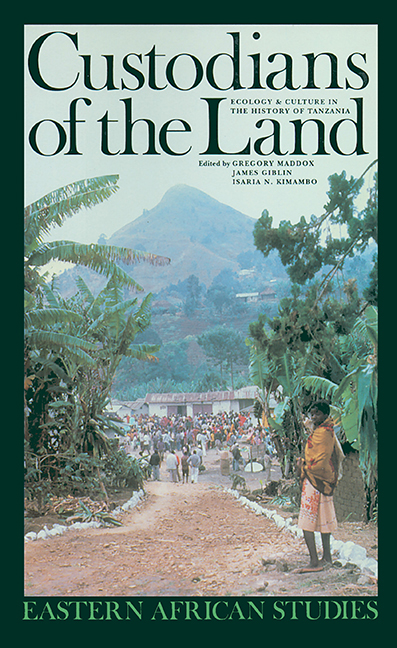Book contents
- Frontmatter
- Contents
- List of Maps, Figures & Tables
- List of Photographs
- Abbreviations
- Contributors
- Acknowledgements
- Introduction Custodians of the Land: Ecology & Culture in the History of Tanzania
- Part One Environmental & Demographic Change
- Part Two Environmental Change & Economic History: In Tanzania's Northern Highlands
- Part Three Politics & Environmental Change
- Part Four Environment & Morality
- Seven Environment, Community & History: ‘Nature in the Mind’ In Nineteenth- and Early Twentieth-Century Buha, Western Tanzania
- Eight Canoe-Building Under Colonialism: Forestry & Food Policies in the Inner Kilombero Valley 1920-40
- Nine Struggles for the Land: The Political & Moral Economies of Land on Mount meru
- Conclusion
- Bibliography
- Index
Nine - Struggles for the Land: The Political & Moral Economies of Land on Mount meru
from Part Four - Environment & Morality
Published online by Cambridge University Press: 30 August 2017
- Frontmatter
- Contents
- List of Maps, Figures & Tables
- List of Photographs
- Abbreviations
- Contributors
- Acknowledgements
- Introduction Custodians of the Land: Ecology & Culture in the History of Tanzania
- Part One Environmental & Demographic Change
- Part Two Environmental Change & Economic History: In Tanzania's Northern Highlands
- Part Three Politics & Environmental Change
- Part Four Environment & Morality
- Seven Environment, Community & History: ‘Nature in the Mind’ In Nineteenth- and Early Twentieth-Century Buha, Western Tanzania
- Eight Canoe-Building Under Colonialism: Forestry & Food Policies in the Inner Kilombero Valley 1920-40
- Nine Struggles for the Land: The Political & Moral Economies of Land on Mount meru
- Conclusion
- Bibliography
- Index
Summary
Recent surveys of environmental history, including the Introduction to this volume, have been at pains to point out what a complex, multifaceted reality the environment is, comprising as it does the natural order, the economic means by which people exploit that order and the social and political means by which they organize that exploitation. Given that all of these elements are socially constructed - not least ideas concerning ‘nature’, ‘order’ and ‘economy’ - they are also deeply embedded in cultural values and beliefs which, in turn, make them appear ‘natural’. Nature, political economy and ideology are thus the necessary bedrocks of any study of environmental change, but while historians have been relatively successful in integrating ecology and political economy, ideology has largely been treated on its own when it has been explored at all. This is not surprising, given the multiple layers of relationships and meanings involved in such a complex exercise, but one means of engaging them all is to focus on a particular environmental category, such as land, that cuts across all the elements and then to explore it in a multidimensional way.
Land encapsulates all these diverse elements in a particularly elegant way. Land as soil has particular physical properties that change as climates, ecosystems and patterns of human exploitation change. Land also is what people divide, occupy and assert rights to - socially and politically - in order to exploit it economically by investing labour and capital in it to transform it and its products. And land is home, its landscapes evoked in art, poetry and song to convey a sense of identity to the people who occupy it. Land thus has very distinctive and different meanings for different peoples, as becomes readily apparent when they vie with one another to occupy, live on and exploit the same area.
Mount Meru in northeastern Tanzania has long been such a contested area, and struggles over land on the fertile, well-watered southern slopes of the mountain have featured strongly in its recent history. During the early nineteenth century land was plentiful, and Arusha and Meru settlers expanded rapidly up its slopes. By the end of the century, however, Meru and Arusha had reached the upper limits of cultivation and came increasingly into conflict with one another as they fought over the vacant areas between them.
- Type
- Chapter
- Information
- Custodians of the LandEcology and Culture in the History of Tanzania, pp. 213 - 240Publisher: Boydell & BrewerPrint publication year: 1996



